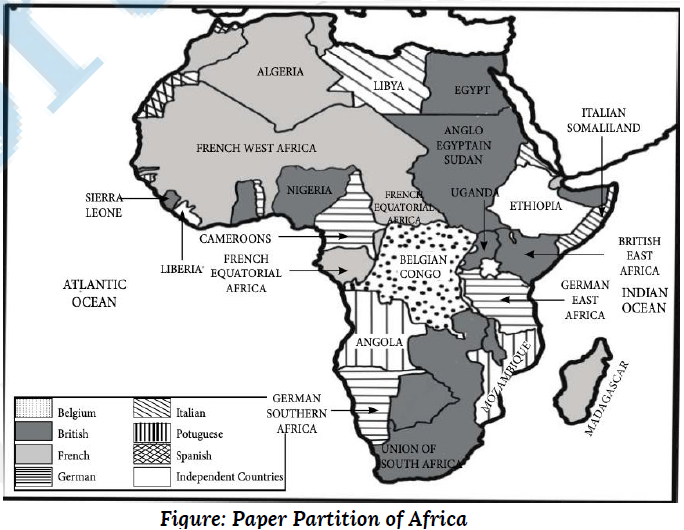23 Dec 2023 : Daily Answer Writing
Mains Answer Writing
23-December-2023
Q1) What were the driving forces for the paper partition of Africa? How did it impact the political and social landscape of the continent?
 The paper partition of Africa refers to the partition of the continent of Africa among the different European powers in the Berlin Conference of 1884, without the representation of African people. The driving forces for the paper partition are as follows:
The paper partition of Africa refers to the partition of the continent of Africa among the different European powers in the Berlin Conference of 1884, without the representation of African people. The driving forces for the paper partition are as follows:
- Role of Bismarck: Going by the ‘Bismarckian concept’ that no colony is worth a war, the imperial powers took a conscious decision not to involve themselves in a war by concluding treaties among the imperial powers.
- Geographical inaccessibility: Due to difficult terrains, nonnavigable rivers, thick forests, etc. the colonial expansion in the interiors was hampered. Thus, paper partition served as the best instrument to exploit the whole continent.
- Exception to nationalistic forces: Nationalism appeared as the most dominant force in international relations since German and Italian unification. However, the paper partition of Africa was envisioned as an exception to nationalistic forces at Berlin Conference.
- Means to mobilize popular support: Many leaders in Europe saw imperialism as means to maximize popular support at home. Ability to acquire colonies overseas and rapid industrialization gave legitimacy to rulers.
- ‘Survival of the fittest’: Acquiring new colonies became necessary for ensuring the survival and evolution of European nations. They believed that because they had racial, technological and civilizational superiority, it’s their responsibility to civilize other inferior races (white man’s burden).
- Industrial Revolution: The rise of capitalism coupled with the adoption of mercantilism, because of the Industrial Revolution led to fierce competition among the colonial powers for natural resources. Thus, African continent provided the best opportunity for such exploitation.
The political and social impacts of the paper partition on the continent of Africa can be seen from:
- Political impacts:
- It cemented the foundation of European colonialism with Africa losing the control over its own land and resources.
- The use of force by Europeans to establish control led to disintegration of people’s sovereignty over themselves and diluted their tribal customs & traditions causing underdevelopment and marginalisation of locals.
- Territorial disputes: The poor territorial demarcation led to disputes culminating into wars. E.g. disputes between Mali and Burkina Faso over Agacher strip.
- Social impacts:
- Inter-ethnic wars: Partioning of territories without taking the cognizance of ethnic realities caused ethnic strifes. E.g., the war between the Hutus and the Tutsis in Rwanda.
- Scramble for Africa deprived the continent of ownership over its natural resources which resulted into perpetual backwardness.
- White superiority/supremacy was a prelude to the later apartheid regime.
Paper partition done with no importance given to ethnic unity, regional economic ties or even natural boundaries disrupted the social and political realities in African continent.
Upload Answer here
For Enquiry

26 Dec 2023 : Daily Quiz

26 Dec 2023 : Indian Express

26 Dec 2023 : PIB

26 December 2023 : The Hindu Editorial Notes PDF

26 Dec 2023 : Daily Current Affairs

23 Dec 2023 : Daily Quiz

23 Dec 2023 : Daily Answer Writing

23 Dec 2023 : Indian Express

23 Dec 2023 : Daily Current Affairs

23 December 2023 : The Hindu Editorial Notes PDF

